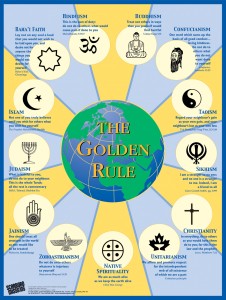The Golden Rule Or The Ethic of Reciprocity “Every religion emphasizes human improvement, love, respect for others, sharing other people’s suffering. On these lines every religion had more or less the same viewpoint and the same goal.” ~ His Holiness the Dalai Lama
Religious groups, as well as non-theistic ethical systems, differ greatly in their beliefs and practices. There is, however, a common thread that runs through them all. Each of these systems of belief has some example of the Ethic of Reciprocity in their teachings. The most common version of this is known as:
The Golden Rule “Do onto others as you would have them do onto you.”
Ancient Egyptian
“Do for one who may do for you, that you may cause him thus to do.” ~ The Tale of the Eloquent Peasant, 109 – 110 Translated by R.B. Parkinson. The original dates to 1970 to 1640 BCE and may be the earliest version ever written.
Bahá’í Faith:
“Ascribe not to any soul that which thou wouldst not have ascribed to thee, and say not that which thou doest not.” ~ Baha’u’llah
Brahmanism:
“This is the sum of Dharma [duty]: Do naught unto others which would cause you pain if done to you”. ~ Mahabharata, 5:1517
Buddhism
“Hurt not others in ways that you yourself would find hurtful.” ~ Udana-Varga 5:18
Christianity
“And as ye would that men should do to you, do ye also to them likewise.” ~ Luke 6:31
Confucianism
“Do not do to others what you do not want them to do to you” ~ Analects 15:23


